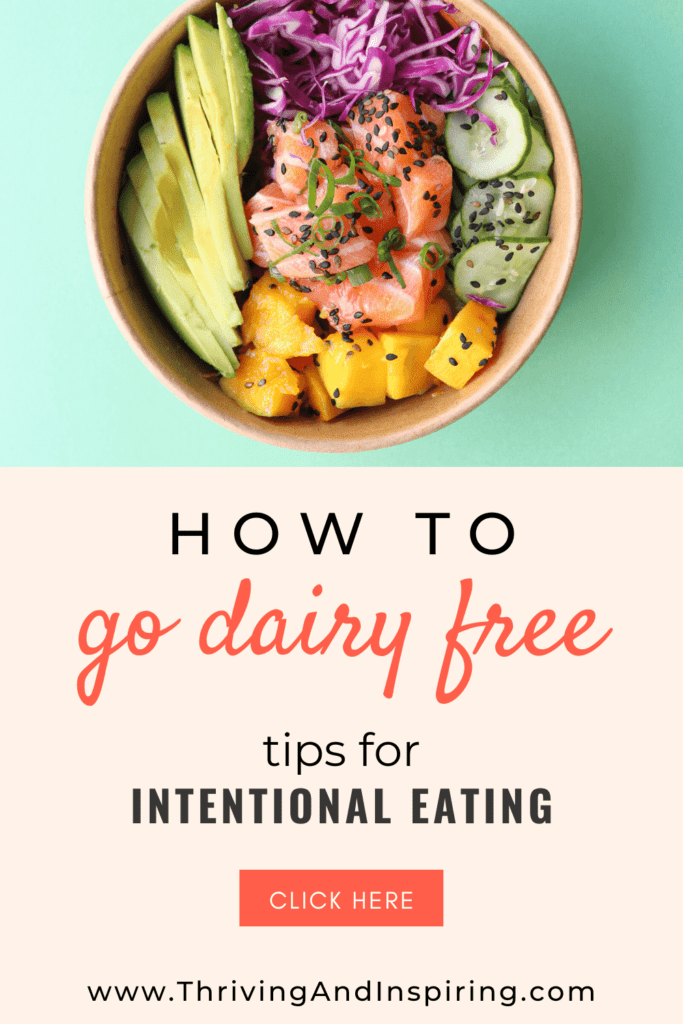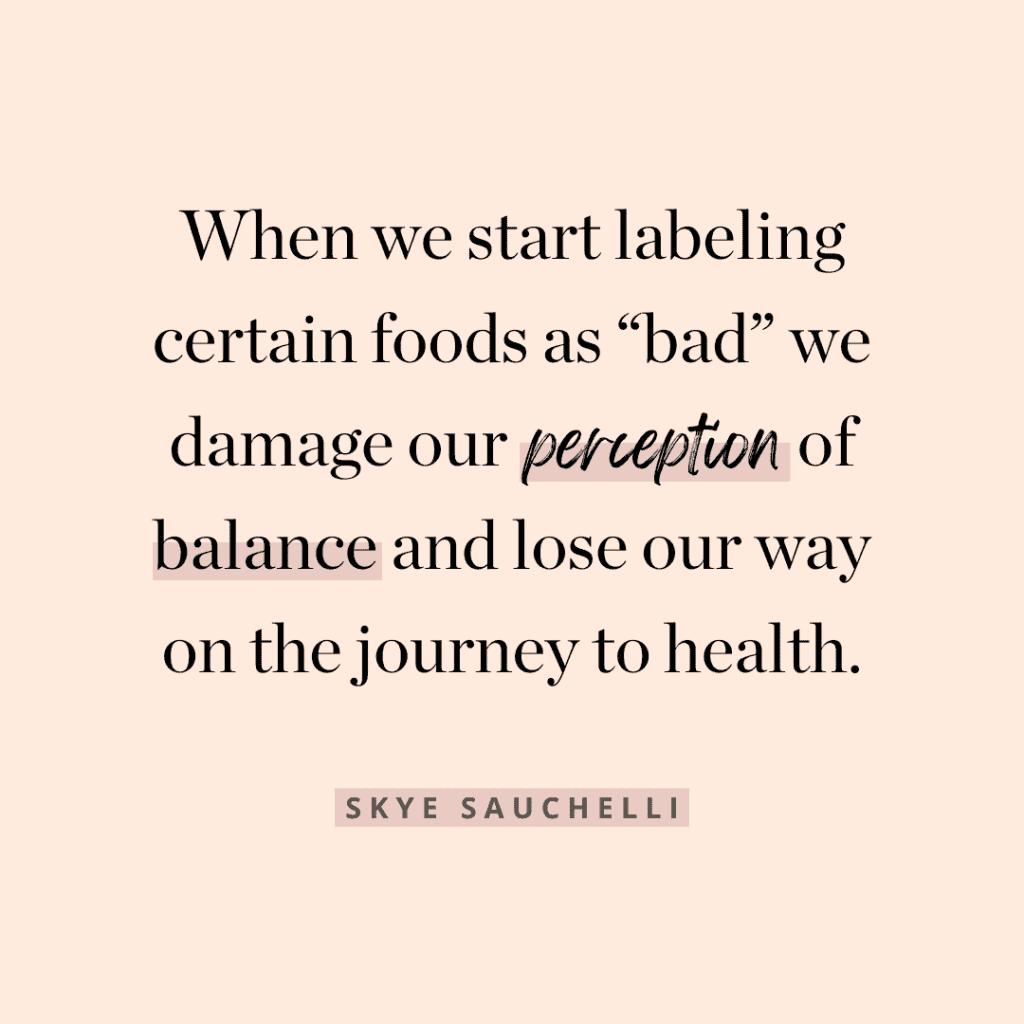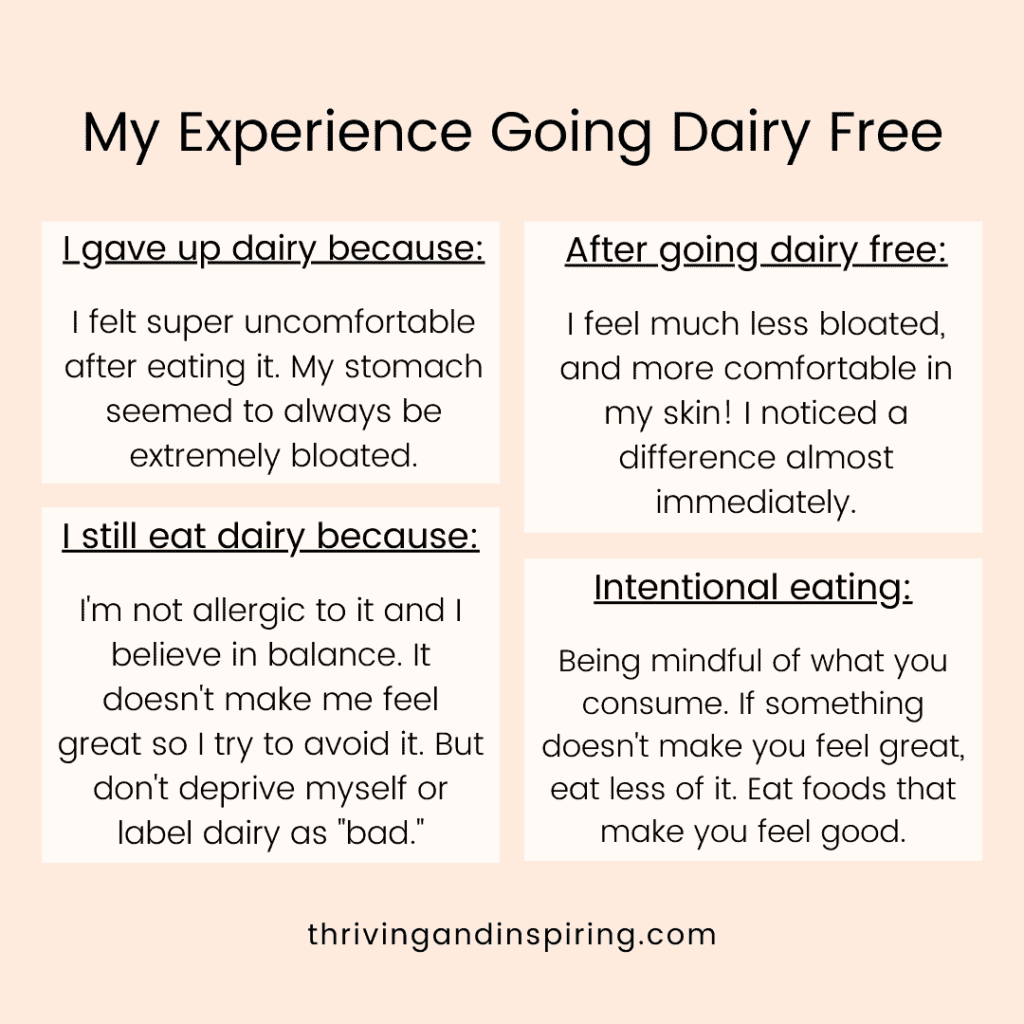Going dairy free was something I experimented with because I was feeling super bloated and uncomfortable. Have you experienced a sensitive stomach too? I had done a few other experiments, things as silly as cutting out gum and drinking through straws to see if extra air was why my stomach was always so bloated. None of them solved my bloating until I tried going dairy free.
Stick around because you’re about to learn what cutting out dairy did for me which will remind you to be intentional about eating foods that make YOU feel good.
IMPORTANT DISCLAIMER
I am NOT a dietician or qualified in any way to give diet advice. I am not a nutritionist or expert in food. However, I am simply sharing MY experience of cutting out dairy in case you wanted to try this too as a way to minimize bloating.
Dairy may not be the cause of your bloating. For me, it was. Please do not take any of what I say in this blog post as total and complete truth or direct advice for your diet. Again, I am just sharing my own story about cutting out dairy in hopes it will get your thoughts flowing about intentional eating.
See the full disclaimer for more info.
This post may contain affiliate links which means I’ll receive a commission if you purchase through my links, at no extra cost to you. Please read full disclosure for more information.

My Experience While Eating Dairy
For years, I’ve had an extended stomach. It was firm and seemed to always be bloated no matter what I did. I eat healthily and exercise and I was so frustrated because my abdomen was always bloated and uncomfortable.
Check out my exercise routine, too!
I asked my Instagram audience for ideas and tips out of desperation because I felt like I had tried everything to “fix” this bloating.
Then one day, a friend told me that she cut out dairy and she felt so much better!
So that was my mission. I did an experiment and stopped eating dairy for a few weeks to see if I felt any better and if my bloating went down.
Some of the things I cut out were milk, cheese, ice cream, yogurt, and sour cream.
To my utter shock, it WORKED!
I no longer felt totally uncomfortable after eating! It was a miracle! And my stomach was no longer constantly distended!
Naturally, I did some more experimenting. After giving up dairy for about a month, I ate something with dairy to see how I would react. This was me basically making sure that dairy was indeed the culprit.
And again, after eating dairy, I felt the way I used to, and my stomach became super bloated yet again.
Note: there is NOTHING wrong with a distended abdomen or even bloating. Bloating is totally normal! You do NOT have to have a flat belly to be healthy or feel good.
I’ve written about managing expectations already, and that may be helpful for you if you find yourself placing high expectations on yourself about your body. And try body image affirmations to help too!
I was on this journey to reduce bloating because for me it was constant, and it didn’t always use to be like that. Years ago, I didn’t have this issue. So it was newer for me and not my status quo.
| Related Reading: How to Eat Healthy Without Going on a Diet: The Ultimate Guide
My Experience Going Dairy Free
How to Make the Switch to Non-Dairy Items
I was eating yogurt every day and cheese in lots of my meals. I was putting milk in my protein shakes and having ice cream for dessert.
When I decided I’d be going dairy free, I had to come up with substitutions for my normal eating habits.
I started having more eggs and less yogurt for breakfast.
I replaced regular cow’s milk with coconut milk. You could try almond or oat milk too, it’s all about preference!
I also started making a lot of dairy-free baked goods and “nice” cream. I already wrote about this amazing dairy-free ice cream recipe.
Related reading: What I Eat in a Day and Why + 6 Tips for Healthy Eating
Substitution also looked like asking for a burger without cheese when we go to our favorite burger place, or leaving the feta off my salad when we go out for dinner. I’ll skip the ranch and be sure to order things where I have the option to ask for no dairy.
When we go out to dinner, it can be especially tempting to get a flatbread or something with ooey gooey cheese, or an indulgent pasta dish with a creamy sauce. But I’ve learned to step outside my box and try other things that allow me to stick to my dairy free diet.
It may feel overwhelming to switch your whole lifestyle to dairy-free. But I’m here to remind you that you don’t have to do it all at once. It’s totally doable if you slowly phase out dairy.
Take it one thing at a time. If you always have cereal in the morning, start by just replacing the milk. Then when you’re ready, move on to removing another item, like cheese, and so on.
Related Reading: 3 Easy, Need-to-Know Changes to Start Eating Healthy

Going Dairy Free- My Experience
When I started cutting out dairy from my diet, I was feeling noticeably more comfortable after eating. It didn’t feel like I had to unbutton my pants after a meal!
I noticed that my stomach wasn’t pushing outwards constantly, my clothes were fitting better, and I felt a lot different. It felt right, like I was giving my body foods that it responded well to!
What was most important is that I felt better!
When I was eating dairy, it wasn’t like I was in pain after doing so. It was more of just an uncomfortable feeling in my belly that wasn’t pleasant. Going dairy free allowed me to remember and realize that I don’t have to be uncomfortable after eating!
It was a wonderful realization and reminder that it’s totally worth it to feed my body with what feels good. I knew that dairy wasn’t it! I also knew that I didn’t feel good after eating heavily processed items.
I was trying to be attuned to what did make my body feel good. And I noticed it was less processed, simpler foods. Things like fruits for a snack and chicken, veggies, and rice for dinner instead of breaded wings or pizza.
If you want to set a health goal, I’ve already written about how to actually set and achieve goals.
Some Exceptions I’ve Made After Cutting Out Dairy
After being very strict about cutting out dairy for that initial few weeks, and after I definitely knew dairy was the cause of some of my bloating, I began to test out eating foods that had dairy as one of the ingredients.
My intention was to see if foods like my protein bread from Aldi and my favorite Quest protein bars and protein cookies would cause me to be wildly uncomfortable or if I could tolerate them better than straight dairy like a glass of milk or cheese stick.
I noticed that foods with dairy as just one of many ingredients didn’t make me bloat as much as straight dairy.
So I make the exception often and have those protein bars and other foods as I see fit!
A Note About Protein Powder
I have used whey protein powder all of my adult life, and when I decided I’d be going dairy free, I was confused about if my protein powder would have to be replaced.
Here’s what you need to know:
There’s whey protein concentrate and whey protein isolate
Concentrate: contains more lactose
Isolate: contains less lactose
One more thing to note is that you may have a sensitivity specifically to A1 casein (cow’s dairy). A1 casein is one of the proteins in dairy products. If so, you may be able to have things like butter and cream since those are much lower in A1 casein.
The other protein in dairy products is whey protein, and the good news is that it’s not inflammatory, meaning it shouldn’t bloat you.
(I got this info from the Period Repair Manual book, which I totally recommend reading! It gave me so much knowledge about my body and hormones that I never knew before!)
To sum it up, I was consuming whey protein while being dairy free! I also did try a vegan protein powder to see if I liked it, and to technically be “completely” dairy free for my experiment.
I like it a lot and still use it alongside of normal whey protein powder.
Cutting Out Dairy Isn’t Always the Answer
I want to be clear that going dairy free was not a magic solution that fixed everything in my life. And it won’t be the cure-all for you either! Cutting out dairy was simply one thing I could do to feel a little bit closer to optimal and ideal! And it’s one thing out COULD try. It’s one of many options!

Here’s Why I Still Eat Dairy Occasionally
I do still have dairy from time to time. And I’m able to do this because I don’t have an allergy to it. I’ve just discovered that eating dairy makes me feel less than optimal. (If you have a strong insensitivity toward something, this approach of still eating it from time to time isn’t going to work for you.)
I still eat dairy after going dairy free because I believe that foods are not inherently good or bad. Dairy is not bad. Cheese is not going to kill you. Milk and yogurt aren’t going to hurt you.
I believe in a good amount of balance. If I understand that dairy doesn’t make me feel great, it would be wise of me to make substitutions where I can. But it also means that if I accidentally eat something with dairy in it (those dips and sauces can be sneaky!) it’s not the end of the world!
And if I choose to have a slice of cake with a friend on her birthday, the world isn’t going to come to an end.
I’ve learned that a bit of flexibility goes a long way! Again, I can operate this way because I don’t have a severe sensitivity or allergy to dairy. If you do, obviously don’t be flexible about it!
Food is Not GOOD or BAD
Let’s adjust how we think about food. When we start labeling certain foods as “bad” we damage our perception of balance and lose our way on the journey to health.
Being healthy doesn’t mean you can’t splurge and have a treat every once in a while. Going dairy free doesn’t mean it’s set in stone forever.
Your body changes and your tolerances can change. What I’m purposing is that we are intentional about simply choosing to eat foods that make us feel good and nourish our bodies well.
If you know that eating dairy, or even gluten or anything else makes you feel crappy, do your best to limit it. You don’t have to avoid it like the plague, but any reduction in that food will simply make you feel that much better!
Going Dairy Free Didn’t Totally Solve My Bloating
Aaaaaall of that said, I DO still get bloated! Like I said earlier, bloating is normal! You are normal if you bloat. You are normal if your belly isn’t flat!
Yes, going dairy free helped reduce my bloating, but other foods still cause me to bloat. I’m sure I’ll do more experimentation in the future to find out what those are.
There are even food sensitivity tests you can do, like Everylywell, to get a better picture of what your body is sensitive to. I’d like to do this test in the future.
| Update: I took this test at the end of September, 2022. My results came back so quickly, and to my surprise, I did not come back as “sensitive” to any of the nine foods it tests for (almond, cow’s milk, egg whites, egg yolk, peanuts, shrimp, soy, tuna, and wheat).
It was honestly relieving to know that I wasn’t actually sensitive to dairy. Now I could move forward with confidence if I wanted to eat small amounts on certain occasions because I knew my body wasn’t actually, genuinely sensitive to it.
My choice to eat or not eat dairy was up to me now since I knew I wasn’t medically sensitive to it.
Now, I like to call myself “dairy light” meaning that I avoid it when I can, but I also eat it sometimes too.
I like the “light” part of that phrase because it allows for flexibility!
Let’s Bring it Home
Now that you’ve heard my story with dairy, I hope that you feel encouraged to simply be more intentional about what you eat. I’m not suggesting that you stop eating dairy, but I AM suggesting that you take stock of what you eat that makes you feel good, and what you eat that makes you uncomfortable or bloated!
It’s really as simple as eating more of what makes you feel good and nourished and less of what makes you feel uncomfortable and bad afterward.
Health does not have to be complicated!
Related Reading
15 Unique Healthy Snack Ideas that are Guilt-Free & Minimal Prep
3 Easy, Need-to-Know Changes to Start Eating Healthy
20 Tips to Have a Better Relationship with Yourself
Reference
The Period Repair Manual by Lara Briden
Share this post with someone who could benefit from it!
And follow me on Pinterest for encouraging graphics!

thanks for this post is very informative
So glad you found it helpful! 🙂
I enjoyed reading this article. I really liked how you said to not label food as good or bad. That’s something my husband and I are trying to change in our dialogue because calling certain foods bad leads to guilt and shame after consuming them.
Such a good point! The last thing we need is to be shaming ourselves!
I have been considering cutting out dairy for quite some time but haven’t been able to take the plunge….I love cheese! Thanks for the great tips on making the move to going dairy free. I’m so glad it helped you….hopefully it will me to when I get in the right mindset!
I’d encourage you to start by going “dairy light” and just cutting back a bit. Then see you you feel! 🙂 (Again, I’m not a doctor, this is just my humble opinion based on my experience, and not direct advice for you.) And I know, I love cheese too, but this doesn’t mean you can NEVER have it again. In all things, there should be flexibility 🙂
I totally agree that we shouldn’t label foods good or bad, it’s just not that simple. Thanks for sharing your experiences as I’m sure many will relate.
Yes! Foods cannot be “good” or “bad” by nature. It’s much more about moderation than anything!
I went dairy free completely about two years ago. It definitely helped my tummy but I couldn’t stick to it 100%. I now drink and use oat milk only but have regular butter. Works for me!
Thank you for sharing your experience! The “dairy light” option is wonderful as a way to find some balance!
Excellent info Skye- thanks for sharing your experience of going dairy-free and how it helped with bloating! I went basically Med Diet and other than some feta crumbles or parm, no dairy. I’ve dropped all refined sugar (barely even use honey) and all wheat product- OMG the difference. I’m much older than you LOL so my over-50 tummy was horrid and I’ve lost many inches. It’s an amazing feeling knowing much of that was bloating and inflammation. So glad you figured all this out so early!
Thanks so much for sharing your experience, Daphne! I’m so glad you’re feeling good!!